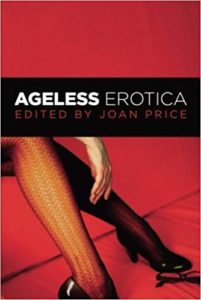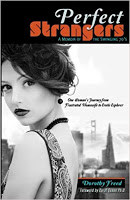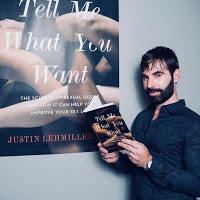Posts Tagged ‘books’
The Joy of Writing about Older Sex (Old Age Sex), guest post by Stella Fosse

Many assume that erotic writers are young people who write about young characters, but more and more people over 60 are discovering the joy of erotic writing and “old age sex”.
Why? When we write sexy stories, we recapture peak moments in our lives. We can conjure all kinds of sensory details that make the story vivid. Or we can imagine an encounter we never had and bring it to life as a fictional story. We realize our desires in a safe space. Anything is possible on the page!
Erotic writing reminds us that we are sexy at every age. As we play with words, we push back on social assumptions about older people and sex. The very act of creating a story is sexy.
Reading erotica created by others our age is also fun, and a great inspiration for old age sex. Some examples I love:
- Dorothy Freed published her sexual memoir, Perfect Strangers, at age 75.
- Joan Price edited a collection called Ageless Erotica, featuring writers Dorothy’s age and older.
- Free Fall by Rae Padilla Francoeur is a fabulously well written erotic memoir with an older heroine.



You’ll find more examples on my website, www.stellafosse.com. These books are enjoyable, and you can even use favorite sentences from their stories as writing prompts for yours.
If you experiment with erotic writing — and please do! — it is important to keep a playful and relaxed attitude about what you write. Even for longtime authors, first drafts are just a place to try things out. So pat yourself on the back for being brave, and write without judging.
Now let’s give it a try!
Recall an especially sexy experience in your life. It could have happened yesterday or twenty years ago. Remember it with all your senses:
- What was the other person’s aroma?
- How did it feel to touch them and for them to touch you?
- What did you say to one another, and what other sounds did you make?
- What did you especially love about the other person’s appearance?
- What about the circumstances: What was going on in your lives that made this moment memorable?
On your first writing day, take just ten minutes and begin to write what you remember. If some aspect of the experience eludes you, feel free to make it up as you go.
The next day, write for ten more minutes about that experience. If you keep writing for ten minutes each day, soon you will have a complete draft of an erotic story that you can look back upon and savor.
I hope you will try writing erotica, and that it brings you much joy.
—–

– Stella Fosse is an erotica writer, the author of Aphrodite’s Pen: The Power of Writing Erotica after Midlife, and a late bloomer whose erotic life blossomed in her late 50s. Access a free story writing course from Stella here.
The Vagina Bible by Jen Gunter: book review
The Vagina Bible: The Vulva and the Vagina—separating the Myth from the Medicine by gynecologist Jennifer Gunter is a lively, educational guide separating information from misinformation, presented in a clear, smart, sassy style.
“There’s a lot of money in vaginal shame,” writes Jen Gunter. She is known as the clever and outspoken OB/GYN on Twitter (@DrJenGunter—follow her!) who challenges celebrities and companies trying to sell us unneeded (and sometimes harmful) solutions for invented problems. She rips their claims and substitutes solid facts. All of this book is educational, revealing, and empowering. Examples:
- “[T]he other problem with doctors not asking about sex is women who have medical conditions that interfere with their sex life, typically conditions that cause pain with sex, end up minimized. Many women suffer for years not realizing they have a medical problem that has a diagnosis and treatment.”
- “It is hard to overestimate the damage done by Sigmund Freud in popularizing the myth of the vaginal orgasm. Only one third of women are capable of achieving orgasm with penile penetration alone…so the idea that everyone should be having orgasms this way results in two thirds of women believing there is something wrong with their sexual wiring when really they are perfect. Not orgasming with unassisted penile penetration is not a flaw, it’s a feature.”
- “MRI studies looking at anatomy during heterosexual sex reveal that the clitoris can be compressed by the penis, which is why some women can orgasm with penile penetration.”
- “Vulvar cleansing has never been studied. That is interesting, considering the array of products that claim to be gynecologist tested or approved…Some of these washes make claims they can reduce bacterial vaginosis (BV). They can’t. An external wash cannot possibly impact the inside of the vagina, and washing internally with one of these products (some women do that—please don’t) could definitely increase your risk of BV by killing good bacteria or irritating the vaginal mucosa.”
Parts of The Vagina Bible are so hilarious that you’ll want—as I did—to read them aloud to a companion:
- “Almost every woman has been told at least once…to wear white cotton underwear as a medical recommendation to prevent yeast infections and other vaginal mayhem. This makes it sound as if vaginas and vulvas are accidents waiting to happen. The vulva can handle urine, feces, and blood, and vaginas can handle blood, ejaculate, and a baby, so this idea that a black lace thong is the harbinger to a vaginal or vulvar apocalypse is absurd.”
- “I have read about plastic surgeons who do labiaplasty [surgical reduction of the labia minora] so women can look ‘sleeker in so-called athleisure wear.’ I know some people call this look ‘camel toe,’ but I prefer ‘labial cleavage,’ and the answer is not surgery—it is better-fitting athletic wear.”
- “I’ve stared at more male butt cracks (gluteal clefts) than I care to remember…What I never hear is that men should seek out plastic surgeons to get their gluteal clefts sewn shut. I also can’t imagine a similar industry for men that profits from surgically trimming penises so they look better in tight jeans.”
 The second half of this book is a serious, comprehensive, scientific resource about infections, conditions, symptoms, and treatments. Dr. Gunter has been treating vulvar and vaginal diseases for nearly 30 years. If you have discomfort, pain, or other symptoms that might be a medical issue, read the relevant chapters of this book, then, armed with this information, take it to your doctor.
The second half of this book is a serious, comprehensive, scientific resource about infections, conditions, symptoms, and treatments. Dr. Gunter has been treating vulvar and vaginal diseases for nearly 30 years. If you have discomfort, pain, or other symptoms that might be a medical issue, read the relevant chapters of this book, then, armed with this information, take it to your doctor.
This guidebook to the care and functioning of the vulva and vagina by cheeky gynecologist Jen Gunter should be on your bookshelf. Thank you, Dr. Gunter, for this much-needed resource: The Vagina Bible.
Perfect Strangers by Dorothy Freed
Dorothy Freed‘s Perfect Strangers: A Memoir of the Swinging Seventies is both one woman’s personal story and the story of an era: the mid-1970s in San Francisco. Freed divorces a husband who cheated on her with her best friend and called her a “frigid bitch” because she didn’t have vaginal orgasms. She goes on to explore her sexuality with whomever she chooses during 4 years of self-described “wanton promiscuity.” She has plenty of sex with plenty of men, yes. But orgasms? Not so easy.
Whether you had a wild side in the 1970s, or you still do, or you didn’t, but wonder what that was like, Freed’s memoir is honest and insightful. She navigates not only hook-ups, but her sense of self as she searches to define her sexuality in her own way — not what her era taught or her ex-husband demanded.
Now 73, Freed looks back at this time of her life with candor and the perspective of a woman who gained much life wisdom and self-knowledge (and many orgasms) since that time. I asked Dorothy a few questions:
JP: What made you want to put this memoir into the world at this point, 40 years later?
 |
| Dorothy Freed then |
Later, when I examined how much I’d learned about myself in that four year span of time, I realized my story was a memoir of the swinging ’70s, with historical significance, and one that needed to be shared with a larger audience.JP: What message do you want people of our age, particularly, to get from your memoir?DF: My message is to look back on the ’70s as an era of unprecedented personal freedom, a time before AIDS colored our sexual world-view in dark hues.
By the end of the memoir, my erotic behavior changed, but not because of fear of disease. I changed it because I saw no future in it. What was missing from my life was love and affection from a male partner. To achieve that, I needed to back away from my casual sex lifestyle, and focus on earning my living by making and selling my artwork — and being open to the possibility of meeting a suitable man.
 |
| Dorothy Freed now |
JP: Any advice to people of our age about exploring their sexuality, whether or not they did it the way you did?
DF: If there’s still a spark alive inside you, reach out to embrace the adventure.
JP: Do you have any regrets?
DF: No, I don’t. Events unfolded as they should. The path I chose was right for me.
“Tell Me What You Want” by Justin Lehmiller: book review
Tell Me What You Want:The Science of Sexual Desire and How It Can Help You Improve Your Sex Life by Justin Lehmiller, Ph.D. is the book we’ve all needed, even if we didn’t know it. We all have sexual fantasies, but we don’t usually share them with others, even our own partners. Many of us agonize about what our fantasies say about us, or we struggle (unsuccessfully) to repress them.
What Is a Sexual Fantasy?
A sexual fantasy is any mental picture that comes to mind while you’re awake that ultimately turns you on … Simply put, a fantasy is a conscious thought that makes you feel all hot and bothered, and maybe gets some blood flowing to your genitals, too.
In this barrier-smashing book, sex researcher Lehmiller surveyed more than 4,000 Americans, ages 18 to 87, who answered 350 detailed questions about themselves, their sex lives, and their sex fantasies. The result is a solidly researched book that answers questions you probably have, such as these:
- How common is my sex fantasy?
- Does my fantasy mean that I’m a bad person?
- What sorts of people have fantasies like mine?
- Should I tell my partner about my fantasy?
- What should I consider before acting out my fantasy?
- What do other people fantasize about?
- What are the most common fantasies?
 My biggest problem reviewing Tell Me What You Want is that it’s so good that I don’t know how to narrow down what I tell you about it. Look at all these Post-Its! Instead of summarizing or interpreting Lehmiller’s points, here are some of them in his own words:
My biggest problem reviewing Tell Me What You Want is that it’s so good that I don’t know how to narrow down what I tell you about it. Look at all these Post-Its! Instead of summarizing or interpreting Lehmiller’s points, here are some of them in his own words:
- Multipartner Sex: The results of my investigation reveal that the single most popular sexual fantasy among Americans today is — drum roll, please — group sex … perhaps the most normal thing there is to fantasize about because almost everyone has been turned on by the thought of it.
- Men and women are not polar opposites when it comes to their sexual psychology … most of the things that men fantasize about, women fantasize about as well.
- Our sexual fantasies appear to be carefully designed to meet our psychological needs — and because those needs change and evolve over our life span, it seems that our sexual fantasies naturally adjust in order to accommodate them.
- There’s a world of difference when it comes to what turns someone on at [different] life stages … older adults — especially those in long-term, monogamous relationships — are more likely to crave something fresh and new … like an orgy or an open relationship.
- According to my survey data, if there’s one specific person who’s likely to appear in your sexual fantasies, it’s your current romantic partner.
- When we feel ashamed or guilty about what turns us on, it can potentially lead to sexual performance difficulties … the more negative emotions [survey participants] reported — things like guilt, shame, embarrassment, fear, anxiety, and disgust — the more sexual problems they had.
- When the novelty of a new relationship has worn off, adding new and exciting elements to your sex life by acting on your fantasies can potentially prevent passion from subsiding and allow it to keep burning.
 There’s more, so much more. Whether you’re interested in the world of sex research, or you just want to understand your own sex fantasies better, or you’re looking for tips for communicating better with your partner, I know you’ll enjoy and learn from Tell Me What You Want:The Science of Sexual Desire and How It Can Help You Improve Your Sex Life, as I did.
There’s more, so much more. Whether you’re interested in the world of sex research, or you just want to understand your own sex fantasies better, or you’re looking for tips for communicating better with your partner, I know you’ll enjoy and learn from Tell Me What You Want:The Science of Sexual Desire and How It Can Help You Improve Your Sex Life, as I did.




